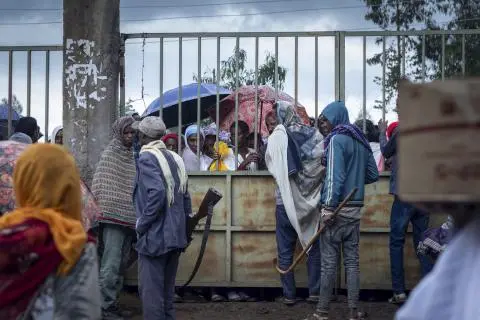
In light of the reports concerning the continued arbitrary detention of numerous individuals, including those from the academic sector, in significant urban areas throughout Ethiopia’s Amhara region since 28 September 2024, Tigere Chagutah, the Regional Director for East and Southern Africa at Amnesty International, stated:
“The Ethiopian army and police’s ongoing campaign of arbitrary mass detentions in Amhara region is yet more evidence of the government’s total disregard for the rule of law. Eyewitnesses have stated that authorities came with a “list” and failed to obtain arrest and search warrants before detaining hundreds of civilians across the region. Those detained have largely not been brought before a court of law within 48 hours, as required by the country’s national laws and constitution.”
The Ethiopian army and police’s ongoing campaign of arbitrary mass detentions in Amhara region is yet more evidence of the government’s total disregard for the rule of law.
Tigere Chagutah, Amnesty International’s Regional Director for East and Southern Africa
“Ethiopian authorities must immediately end these arbitrary arrests, press charges against those detained for internationally recognized crimes and follow due process, or release them without further delay. It is time for the authorities to stop using arbitrary detention as a tool of repression”.
Background

In recent months, Amnesty International has documented harassment, intimidation, and relentless attacks on journalists and human rights defenders by Ethiopian authorities, driving many into exile. This exodus of critical voices has severely diminished reporting and documentation of ongoing human rights violations, particularly in conflict-affected areas like the Amhara region.
These latest arbitrary arrests of academics and civil servants risk further eroding freedom of expression. Reports indicate that members of the academic community at federal universities in the Amhara region are among those arrested. Witnesses also told Amnesty International that some arrests were made late at night, including by members of the

The situation in the old country is getting weirder and weirder. In one part of the country, there is a bloody conflict that disrupted the economy of the area and the area next to it has a booming economy. For example, in western part Oromia and in parts of Wellega, the economy has been in shambles for more than 4 years now. But in several areas nearby the economy is still functioning very well. The same scenarios exist in the Amhara region also. If you look at the regional level you can hear a pin drop and the economy is booming red hot in Somalia region while next door in Oromia things are not so rosy. What a strange country!!! The situation in the old country is getting weirder and weirder. In one part of the country, there is a bloody conflict that disrupted the economy of the area and the area next to it has a booming economy. For example, in western part Oromia and in parts of Wellega, the economy has been in shambles for more than 4 years now. But in several areas nearby the economy is still functioning very well. The same scenarios exist in the Amhara region also. If you look at the regional level you can hear a pin drop and the economy is booming red hot in Somalia region while next door in Oromia things are not so rosy. What a strange country!!!